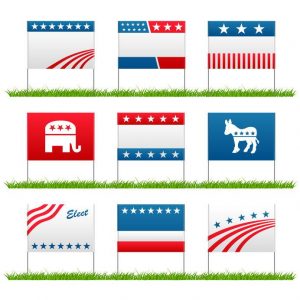 On January 5, 2021, all eyes will turn to Georgia voters as they determine which political party will control the U.S. Senate in two separate runoff elections. This means that, in addition to the abundance of holiday decorations, many homeowners will also pepper their yards with political signs to support their candidates. For those living in a Georgia community association, it is important to understand that your First Amendment right to free speech does not trump—no pun intended—the association’s right to impose reasonable restrictions on political signs.
On January 5, 2021, all eyes will turn to Georgia voters as they determine which political party will control the U.S. Senate in two separate runoff elections. This means that, in addition to the abundance of holiday decorations, many homeowners will also pepper their yards with political signs to support their candidates. For those living in a Georgia community association, it is important to understand that your First Amendment right to free speech does not trump—no pun intended—the association’s right to impose reasonable restrictions on political signs.
Constitutional rights, including the right to free speech, are rights guaranteed to citizens by the government. Since community associations are not considered government entities, they are not required to comply with the constitutional requirements imposed on the government. In fact, in Bryan v. MBC Partners, L.P., 246 Ga. App. 549, 541 S.E.2d 124 (Ga. App., 2000), the Georgia Court of Appeals held that a community association had the right to prohibit all signs in accordance with its publicly recorded restrictive covenants. Many community associations have some type of limitation on placing signs within the community without approval from the board or architectural control committee. However, there are usually exceptions (e.g., “for sale” signs, security signs, or other similar signs).
Although MBC Partners authorizes Georgia community associations to prohibit signs in the community, not all states are in agreement on the issue. For example, in Mazdabrook Commons Homeowners Ass’n v. Khan, 210 N.J. 482, 46 A.3d 507 (N.J., 2012), the New Jersey Supreme Court held that homeowners had a right to free political speech in the form of signs to support a candidate for public office, and therefore, a complete ban on signs in a community association (other than “for sale” signs) was unconstitutional. While this is not the prevailing law in Georgia, the conflict between states suggests that may be safer for a Georgia community to err on the side of caution and allow political signs, but with certain reasonable restrictions.
The U.S. Supreme Court has also ruled in a number of cases that local governments can regulate political signs by limiting the size of the sign, the number of signs on one lot, the location of the signs, and the amount of time that the signs can be displayed. Those cases also require that the signs be professionally created. Georgia community associations should utilize these regulations as a roadmap for a board resolution, rule, or amendment that restricts signage. In doing so, the board can protect both the appearance of the community and an individual’s desire to express their political opinions.
In sum, your community should keep an eye on this issue over the next month and, if applicable, review its signage rules and regulations, as well as the local city/county ordinances regarding the same. Depending on how many signage issues come up, it may make sense to broaden or elaborate on existing signage rules. Most importantly, simply reminding homeowners of the relevant rules and regulations prior to each election season could lessen conflict and result in a more issue-free season overall.
